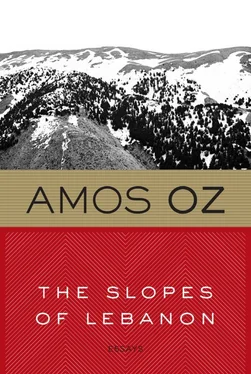Davar Hashavua, August 20, 1982,
based on Part 1 of an interview with Niva Lanir
THIS GOVERNMENT MUST go immediately. The horror of Beirut must be investigated immediately.
Is there a contradiction between these two demands? Is this perhaps a premature verdict of guilt?
The answer is no, on both counts.
Who is “guilty” of the mass murder at the refugee camps in Beirut? The guilty parties, the murderers, are our protégés, our pets, our allies — the Christian Phalangists. They and they alone.
Who is “responsible”? The responsible party is the Begin government, and the Begin government alone. One who invites the Boston strangler to spend two nights in an orphanage cannot claim, when he sees a pile of dead bodies the next morning, that he had asked the man only to wash the ears and necks of the orphans.
What, then, must a judicial commission investigate?
It must investigate who gave the orders, and when, how, and why.
When was the administration first informed of the massacre? What did it do, or fail to do, when it found out? When did it report or fail to report it? Who lied to the nation, to the Knesset, and perhaps even to the government of Israel?
“Our hands did not spill this blood and our eyes did not see,” said former Chief Rabbi Shlomo Goren on the eve of Yom Kippur, rolling his eyes heavenward.
“Your hands are covered with blood,” said the prophet Isaiah.
“For they had eyes but they did not see,” said the prophet Jeremiah.
Veteran defeatists, both of them. Troublers of Israel. Self-hating Jews.
May this year and its evils end together, and may wickedness be dispersed like smoke.
Davar, September 28, 1982,
written on the eve of Yom Kippur 5743
THESE ARE TOUGH times. Never before has Israel been assaulted by an almost daily bombardment of plans for agreements, suggested solutions, peace proposals: the Venice document, the Fahd plan, the Reagan plan, the Fez plan, the Hussein proposal, the Khawatme declaration, the Syrian statement. And who knows what tomorrow will bring? From good to bad, or, to be precise, from almost good to propaganda gimmicks?
The Begin government reacts to all of them as though to an evil barrage of Katyushas: sounding the sirens, urging the nation to go down to the bomb shelters, crying “foul”—and aiming a salvo of verbal fire at the enemy’s position.
Actually, it is no surprise that a government that has chosen to call a premeditated war by the name Peace should react to peace initiatives as though they were declarations of war. No wonder it responds with heavy-handed indictments of animosity and ridicule; all of it, from Reagan to Khawatme, is furiously rejected out of hand.
Yet the entire range of recent proposals, some, indeed, “proposals” in quotes, and some, indeed, “peace” in quotes, deserves a careful and considered response, not a high-pitched cry of panic.
Certainly there is no reason for us to give an unqualified yea to President Reagan or to say amen to King Fahd. There is no reason for us to fall on the necks of the Syrian gentlemen or of Naif Khawatme. But neither is there any need to barricade ourselves on the rooftops, sniveling and crying that it’s all lies and deceit, shrieking that we reject it all, out of hand, that it must never materialize, that we will never agree or let ourselves be seduced — never, not ever, not for the rest of eternity. That is the style of this regime. And the style of this regime is very sick.
A normal nation, like a normal person, when enemies approach with peace proposals, wisely invites them in for a cup of coffee. If they accept, fine. We will sit down with them on the front porch and bargain, soberly, patiently, and reasonably. If they don’t accept, then their insincerity will be exposed for all to see, their bluff called, and we will be blameless.
“One doesn’t ask a man where he spends his nights,” Begin spouted haughtily. So be it. The nocturnal adventures of the prime minister are an issue between him and Mrs. Begin, and we will maintain a tactful silence. But, by all the rules of etiquette, we are entitled to ask this man and his friends what they do during the daylight hours, hours during which statesmen — at least between one revilement and the next — get paid to sit and negotiate with friends and sometimes even with enemies. Why don’t they invite all these peacemongers for a cup of coffee and a session of political give-and-take? Does Reagan have some new ideas for the resolution of the Middle East conflict? Welcome, Mr. President, have a seat; would you like a brandy or perhaps some coffee or a cold drink and some cake? And then we’ll tell him politely that paragraph three seems quite nice but, by your leave, we have a different suggestion in place of paragraph five. Are King Fahd, King Hussein, Foreign Minister Khaddam, or that esteemed terrorist Khawatme offering us a peace plan that is deceitful and dangerous? Won’t you come in, Your Majesties? The first door on the right. It’s good to have you here at last, Mr. Syria. By the way, dear Mr. Terrorist, we are in the habit of leaving our submachine guns in the cloakroom. Please be seated, gentlemen. We’ll be very glad to listen to what you have to say, but after that, will you kindly listen to what we have to say? And if we can’t settle the issue today, maybe we’ll be able to settle it after three or four more meetings, or another ten or twenty. Your opening proposal is unacceptable to us. So sorry. Would you be kind enough to try again? We, too, will think hard and try again. It was so good of you to come. We’d be delighted to return your visit. And in the meantime, let’s all stop shooting and go on seeing each other.
That is the way a sane human being responds to a peace proposal. That is the response of a sane nation.
And what do we do?
For us, the style is the government, and the style of this government is insane. Here, for example, are two recent pearls of wisdom:
“Only Arik Sharon can prevent various and sundry meddlers from stealing southern Lebanon from us, after the Americans managed to snatch Beirut from us… under the pressure of public hysteria unleashed by the Labor party” (from a public statement of the Liberal party think tank). What intellectual honey! What liberalistic incense! Why, their own mothers wouldn’t be able to recognize them, these latter-day Liberal thief-catchers and traitor-hunters.
“After this war… our enemies will learn to be careful and not even sneeze anywhere near Israel” (Knesset member Yigael Horowitz in a public interview). Bless you, Mr. Horowitz. Warm regards from all the arrogant and haughty phrases that were buried — together with three thousand of our boys — after Yom Kippur 1973.
Indeed, not another sneeze or cough, not a yawn or a hiccup on the turf of this Beginist Israel. No more peace initiatives and no more proposals for solutions. Not even a little bird will be allowed to chirp around here. Please don’t say “Shalom” when you meet Israel in the street; she may go berserk with fury. Please don’t knock on the door. Please don’t call us on the phone. And do not sneeze in our vicinity: We are sick here.
And what next?
We will overcome. This, too, shall pass. And we will recover.
Davar, June 6, 1982
IN MEMORIAM EMIL GRUNZWEIG
(Remarks made at a Peace Now rally, Jerusalem, February 17, 1983, at the end of the seventh day of mourning after his murder)
ONE WEEK AGO, on this spot, our friend Emil Grunzweig was murdered. We still do not know who murdered him and tried also to murder many of his friends. But we know that Emil died because of his love of freedom, of peace, of justice, of Israel, and of life itself.
Читать дальше












